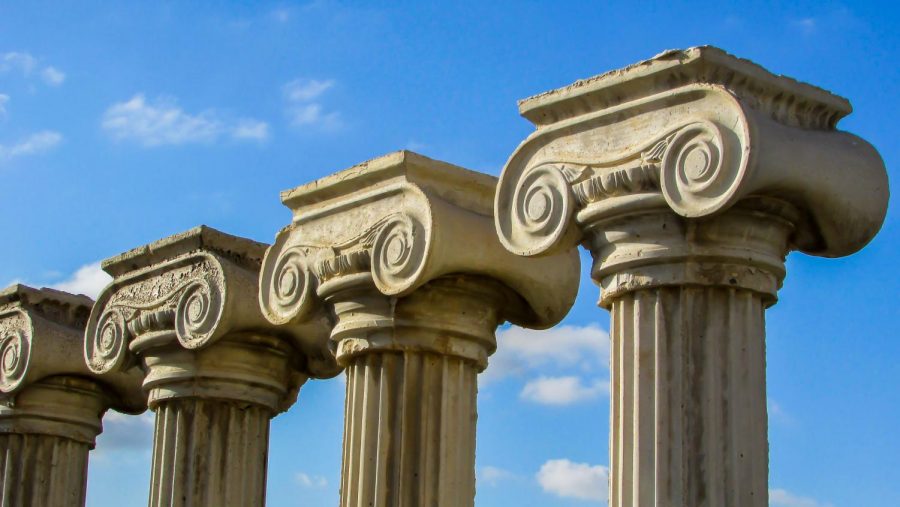Greek mythology lives on: an overview of the gods through the ages
March 25, 2021
Dating back to the 8th century BC, greek mythology has been around long before our ancestors, and their ancestors, walked the earth. Time and time again, history is shown to have an enormous impact on the present day, and this continues to ring true with the modern adaptations of greek architecture, lore and ideals.
At the heart of Greek mythology, there are 12 gods and goddesses who reside on Mount Olympus, the highest mountain in Greece:
- Zeus (*Jupiter): the king of all the gods
- Hera (Juno): the queen of the gods
- Aphrodite (Venus): goddess of beauty and love
- Apollo (Apollo): god of prophecy, music and poetry
- Ares (Mars): god of war
- Artemis (Diana): goddess of the hunt
- Athena (Minerva): goddess of wisdom
- Demeter (Ceres): goddess of agriculture and grain
- Dionysus (Bacchus): god of wine
- Hephaestus (Vulcan): god of fire
- Hermes (Mercury): god of travel, hospitality and trade, Zeus’s personal messenger
- Poseidon (Neptune): god of the sea
*There are two main types of mythology commonly known today. The first one is Greek mythology, which includes common names such as Zeus, Hades, Poseidon. The other well-known type is Roman mythology. The main difference is that Greek mythology originated from “The Iliad” by Homer and Roman lore is from “Aeneid” by Virgil. Though there are two different types of mythology, most gods and goddesses have Roman/Greek counterparts.
Greek mythology has translated to different brands and is still widely popular today. Popular brand names include Amazon, inspired by the Amazon warriors mentioned in the “Iliad.” The warriors were a part of the tribe of Scythians. They were known as noble competitors who fought on horseback and were legendary archers.
Another well-known brand is Nike; Nike is the goddess of victory and the company likely chose this name to encourage athletes who use the brand to envision themselves as victorious in all of their athletic pursuits.
“I think greek mythology is really interesting,” senior Grace Brennan said. “It’s like a giant story where everything is connected and every character has their own backstory. And the images I’ve seen, [of ancient greece] are so beautiful.”
Other brands include, but are not limited to: Pandora (first woman, Pandora’s box), Versace (logo is the head of Medusa), Starbucks (twin-tailed mermaid/siren logo), Dove (represents Aphrodite and her beauty), Trident (Poseidon’s trident) and Hermès (god of travel).
Many schools also have team names such as the Titans, Spartans, Trojans, etc.
There are also a large number of books that are related to concepts first mentioned in greek mythology. One of the most well-known series for young adult readers that features mythology is the “Percy Jackson” series by Rick Riordan, which follows the story of young Percy Jackson, the son of Poseidon. Almost all of Riordans work centers around Greek and Roman mythology and its relationship with the world in modern day.
Other popular books and movies include “A Thousand Ships” By Natalie Haynes, a retelling of the Trojan war, “Circe” By Madeline Miller, a story about the god of the sun named Helios and “The Penelopiad” by Maragret Atwood, the women’s perspective on “The Odyssey” by Homer.
The everlasting impact of Greek mythology on modern day culture is prevalent and it is abundantly clear that stories and beliefs told long ago are here to stay. Just as religions such as Christianty, Hinduism and Judaism follow sacred texts, the Greeks follow the example of their gods and goddesses, hoping to prove their worth. Greek mythology’s impact on culture today across the globe, showcases the diversity of the gods and how they are so versatile and can be used as logos for brands, books, songs and movies.
“I’ve always been a big fan of Greek mythology, I like the history behind all of it and how it’s changed over the years,” senior Taylor Hopkins said. “I like to try and imagine what it would have been like all those years ago when people believed heavily in the gods and their importance. I’ve been obsessed with the Percy Jackson series for a while and all of it just provides a means of escape when I want to go somewhere but can’t actually leave my house.”
Aside from brands, lore and religion, greek mythology has also had a heavy impact on modern day architecture. Large columns, mainly ionic, doric and corinthian styles, were popularized in ancient greece and are still used today across the globe.
“It’s fascinating how much greek architecture has influenced modern day architecture,” junior Jenna Lee said. “The history behind it is so foreign to me, so I would love to learn more.”
Many students at Scotch Plains-Fanwood High School have expressed their interest in the unique history of greek mythology and perhaps one day we will see an ancient mythology class at our school.



